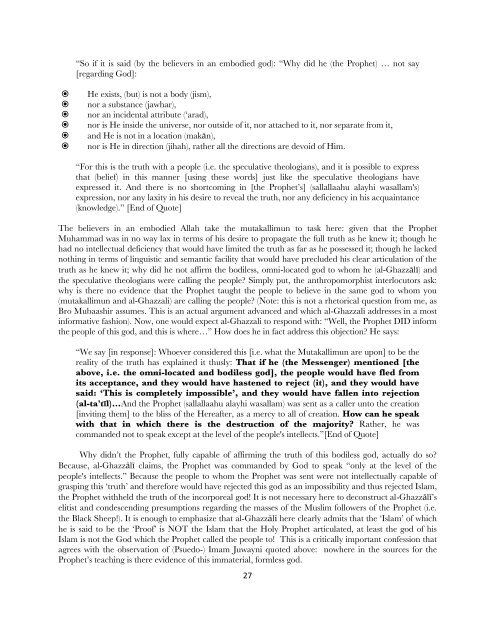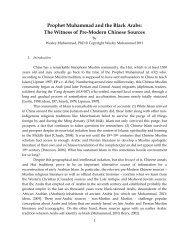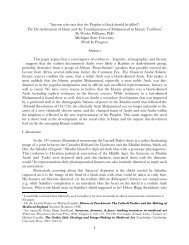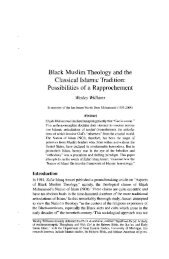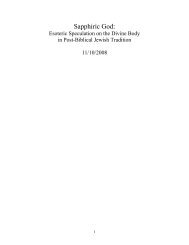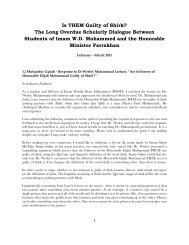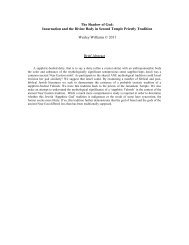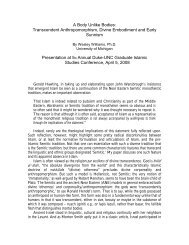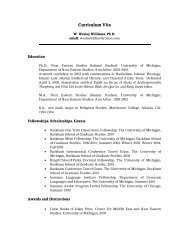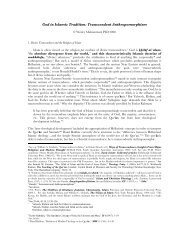Is THEM Guilty of Shirk? - Dr. Wesley Muhammad
Is THEM Guilty of Shirk? - Dr. Wesley Muhammad
Is THEM Guilty of Shirk? - Dr. Wesley Muhammad
You also want an ePaper? Increase the reach of your titles
YUMPU automatically turns print PDFs into web optimized ePapers that Google loves.
―So if it is said (by the believers in an embodied god): ―Why did he (the Prophet) … not say<br />
[regarding God]:<br />
He exists, (but) is not a body (jism),<br />
nor a substance (jawhar),<br />
nor an incidental attribute (‗arad),<br />
nor is He inside the universe, nor outside <strong>of</strong> it, nor attached to it, nor separate from it,<br />
and He is not in a location (makān),<br />
nor is He in direction (jihah), rather all the directions are devoid <strong>of</strong> Him.<br />
―For this is the truth with a people (i.e. the speculative theologians), and it is possible to express<br />
that (belief) in this manner [using these words] just like the speculative theologians have<br />
expressed it. And there is no shortcoming in [the Prophet‘s] (sallallaahu alayhi wasallam's)<br />
expression, nor any laxity in his desire to reveal the truth, nor any deficiency in his acquaintance<br />
(knowledge).‖ [End <strong>of</strong> Quote]<br />
The believers in an embodied Allah take the mutakallimun to task here: given that the Prophet<br />
<strong>Muhammad</strong> was in no way lax in terms <strong>of</strong> his desire to propagate the full truth as he knew it; though he<br />
had no intellectual deficiency that would have limited the truth as far as he possessed it; though he lacked<br />
nothing in terms <strong>of</strong> linguistic and semantic facility that would have precluded his clear articulation <strong>of</strong> the<br />
truth as he knew it; why did he not affirm the bodiless, omni-located god to whom he (al-Ghazzālī) and<br />
the speculative theologians were calling the people? Simply put, the anthropomorphist interlocutors ask:<br />
why is there no evidence that the Prophet taught the people to believe in the same god to whom you<br />
(mutakallimun and al-Ghazzali) are calling the people? (Note: this is not a rhetorical question from me, as<br />
Bro Mubaashir assumes. This is an actual argument advanced and which al-Ghazzali addresses in a most<br />
informative fashion). Now, one would expect al-Ghazzali to respond with: ―Well, the Prophet DID inform<br />
the people <strong>of</strong> this god, and this is where…‖ How does he in fact address this objection? He says:<br />
―We say [in response]: Whoever considered this [i.e. what the Mutakallimun are upon] to be the<br />
reality <strong>of</strong> the truth has explained it thusly: That if he (the Messenger) mentioned [the<br />
above, i.e. the omni-located and bodiless god], the people would have fled from<br />
its acceptance, and they would have hastened to reject (it), and they would have<br />
said: ‘This is completely impossible’, and they would have fallen into rejection<br />
(al-ta'tīl)…And the Prophet (sallallaahu alayhi wasallam) was sent as a caller unto the creation<br />
[inviting them] to the bliss <strong>of</strong> the Hereafter, as a mercy to all <strong>of</strong> creation. How can he speak<br />
with that in which there is the destruction <strong>of</strong> the majority? Rather, he was<br />
commanded not to speak except at the level <strong>of</strong> the people's intellects.‖[End <strong>of</strong> Quote]<br />
Why didn‘t the Prophet, fully capable <strong>of</strong> affirming the truth <strong>of</strong> this bodiless god, actually do so?<br />
Because, al-Ghazzālī claims, the Prophet was commanded by God to speak ―only at the level <strong>of</strong> the<br />
people's intellects.‖ Because the people to whom the Prophet was sent were not intellectually capable <strong>of</strong><br />
grasping this ‗truth‘ and therefore would have rejected this god as an impossibility and thus rejected <strong>Is</strong>lam,<br />
the Prophet withheld the truth <strong>of</strong> the incorporeal god! It is not necessary here to deconstruct al-Ghazzālī‘s<br />
elitist and condescending presumptions regarding the masses <strong>of</strong> the Muslim followers <strong>of</strong> the Prophet (i.e.<br />
the Black Sheep!). It is enough to emphasize that al-Ghazzālī here clearly admits that the ‗<strong>Is</strong>lam‘ <strong>of</strong> which<br />
he is said to be the ‗Pro<strong>of</strong>‘ is NOT the <strong>Is</strong>lam that the Holy Prophet articulated, at least the god <strong>of</strong> his<br />
<strong>Is</strong>lam is not the God which the Prophet called the people to! This is a critically important confession that<br />
agrees with the observation <strong>of</strong> (Psuedo-) Imam Juwayni quoted above: nowhere in the sources for the<br />
Prophet‘s teaching is there evidence <strong>of</strong> this immaterial, formless god.<br />
27


